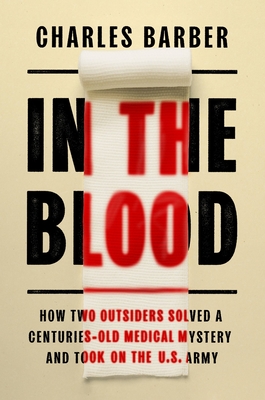In the Blood: How Two Outsiders Solved a Centuries-Old Medical Mystery and Took on the US Army

In the Blood: How Two Outsiders Solved a Centuries-Old Medical Mystery and Took on the US Army
The "high-stakes" true story of how an absent-minded inventor and a down-on-his-luck salesman joined forces to create a once-in-a-generation lifesaving product: "Suspenseful storytelling helps us see and feel the struggle and frustration, the sweat and tears . . . Inspiring" (Robert Kolker, #1 New York Times bestselling author of Hidden Valley Road).
At the 1993 Battle of Mogadishu, dramatized by the popular film Black Hawk Down, the majority of soldiers who died were killed instantly or bled to death before they could reach an operating table. This tragedy reinforced the need for a revolutionary treatment that could transform trauma medicine. So, when Frank Hursey and Bart Gullong--who had no medical or military experience--discovered that a cheap, crushed rock called zeolite had blood-clotting properties, they brought it to the military's attention. The Marines and the Navy adopted the resulting product, QuikClot, immediately. The Army, however, resisted. It had two products of its own being developed to prevent excessive bleeds, one of which had already cost tens of millions of dollars. The other, "Factor Seven," had a more dangerous complication: its side effects could be deadly. Unwilling to let its efforts end in failure--and led by the highly influential surgeon Colonel John Holcomb--the Army set out to smear QuikClot's reputation. Over the course of six years, Hursey and Gullong engaged in an epic struggle with Holcomb for recognition. Ultimately, a whistle-blower inside the Army challenged the Army's embrace of Factor Seven, which resulted in a massive lawsuit led by the U.S. Department of Justice. The lawsuit focused further attention on the financial ties between the pharmaceutical company that produced Factor Seven and Holcomb's research institute. By withholding QuikClot--which later became the medical miracle of the Iraq War--and in the use of Factor Seven with its known, life-threatening risks of heart attacks and strokes, the lives of countless soldiers were imperiled. Using deep reportage and riveting prose, In the Blood recounts this little-known David-and-Goliath story of corruption, greed, and power within the military--and the devastating consequences of unchecked institutional arrogance.PRP: 179.80 Lei
Acesta este Prețul Recomandat de Producător. Prețul de vânzare al produsului este afișat mai jos.
161.82Lei
161.82Lei
179.80 LeiIndisponibil
Descrierea produsului
The "high-stakes" true story of how an absent-minded inventor and a down-on-his-luck salesman joined forces to create a once-in-a-generation lifesaving product: "Suspenseful storytelling helps us see and feel the struggle and frustration, the sweat and tears . . . Inspiring" (Robert Kolker, #1 New York Times bestselling author of Hidden Valley Road).
At the 1993 Battle of Mogadishu, dramatized by the popular film Black Hawk Down, the majority of soldiers who died were killed instantly or bled to death before they could reach an operating table. This tragedy reinforced the need for a revolutionary treatment that could transform trauma medicine. So, when Frank Hursey and Bart Gullong--who had no medical or military experience--discovered that a cheap, crushed rock called zeolite had blood-clotting properties, they brought it to the military's attention. The Marines and the Navy adopted the resulting product, QuikClot, immediately. The Army, however, resisted. It had two products of its own being developed to prevent excessive bleeds, one of which had already cost tens of millions of dollars. The other, "Factor Seven," had a more dangerous complication: its side effects could be deadly. Unwilling to let its efforts end in failure--and led by the highly influential surgeon Colonel John Holcomb--the Army set out to smear QuikClot's reputation. Over the course of six years, Hursey and Gullong engaged in an epic struggle with Holcomb for recognition. Ultimately, a whistle-blower inside the Army challenged the Army's embrace of Factor Seven, which resulted in a massive lawsuit led by the U.S. Department of Justice. The lawsuit focused further attention on the financial ties between the pharmaceutical company that produced Factor Seven and Holcomb's research institute. By withholding QuikClot--which later became the medical miracle of the Iraq War--and in the use of Factor Seven with its known, life-threatening risks of heart attacks and strokes, the lives of countless soldiers were imperiled. Using deep reportage and riveting prose, In the Blood recounts this little-known David-and-Goliath story of corruption, greed, and power within the military--and the devastating consequences of unchecked institutional arrogance.Detaliile produsului










